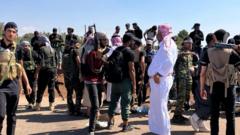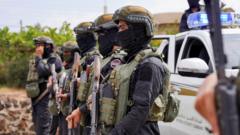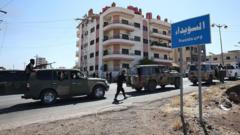In the wake of Bashar al-Assad's regime, Syria witnesses an unprecedented social liberation, igniting hopes for a democratic future. However, with rising fears of religious influence and power concentration, questions loom over the sustainability of these freedoms as the nation reshapes its political landscape.
A New Dawn for Syria: Balancing Freedom with Uncertainty

A New Dawn for Syria: Balancing Freedom with Uncertainty
As Syrians celebrate newfound freedoms post-Assad, concerns grow about the fleeting nature of democracy and the potential rise of influence from conservative forces.
In the crisp morning of December 8, 2024, I crossed into Syria at the Lebanese border, filled with a mix of hope and trepidation. Gone was Bashar al-Assad, who ruled for over two decades. Rebel forces swiftly toppled the regime, sparking a surge of optimism among the populace. It was a moment validation for many Syrians, like myself, who had only ever experienced the iron grip of Assad's dictatorship.
For decades, we were subjected to state-sanctioned violence, fear, and monitoring—a reality that culminated in the civil war beginning in 2011, which devastated our country. I had been among those arrested during the early protests, only escaping to find refuge in another country. Yet now, after years of hardship, the streets of Damascus echoed with joy as citizens celebrated their newfound freedom.
In the weeks following the regime's fall, the cultural landscape of Syria transformed remarkably. Across Umayyad Square, discussions sparked among strangers; hopes for the future were shared openly in cafes that once served as venues for covert conversations. A sense of triumph and possibility filled the air. Prominent exiles returned, seen as harbingers of change, and no longer shackled by the fear of imprisonment.
As we watched the new government's formation, the complexity of this newfound liberty began to reveal itself. While there was excitement over cultural revival, deep concerns lingered about the kind of democracy that would emerge and the influence of religious entities over governance.
The vibrant arts scene, which once flourished under the cover of repression, began reclaiming its space. Writers and musicians felt liberated, and discussions of political thought surged where once censorship prevailed. Yet, shadows loomed over the cultural revival—warnings surfaced about the new authorities potentially pushing a more conservative political and cultural agenda.
Despite initial openness, the concentration of power raised eyebrows, particularly in relation to the interim president Ahmed al-Sharaa's leadership. His past affiliation with an extremist group raised concerns about whether Syria might slip into a new form of dictatorship under different clothing. Authorities, though promising free elections and a constitutional framework, had not yet created a system to ensure accountability among leaders.
Amid the debates over Syria's future governance, remnants of the past still influence discussions. The interim government harbors individuals with ties to the oppressive regime, stirring questions about representation and the potential marginalization of various demographic groups, including women.
The new government has been urged to create an inclusive environment, prompting discussions around representation that could foster stability. Nevertheless, early signs indicate a potential backlash against the rights secured for women under Assad’s rule. Unwritten pressures replacing written laws pose a threat to equal rights, cautioning women's advocates who have fought so long for their place.
On the streets of Damascus, alongside social debates about cultural representations, there were conversations about the resurgence of religious conservatism. Some citizens expressed apprehension about the imposition of stricter societal regulations—an echo of the dark days they thought they’d left behind.
As violence persists in certain regions and camps of displaced families remain, the road ahead is fraught. Local and international observers question whether the newly liberated Syrian society is prepared for endurance amidst shifting power dynamics. The vision for future governance remains conflicted, with emerging tensions between aspirations for democracy and pressures for conservative governance.
The celebration of liberation may thus be tempered by the reality that the quest for a stable, democratic Syria is still in its infancy. In the face of historical skepticism, we are left with the daunting question: can these freedoms prevail against the potential for regression, and will the spirit of this new dawn hold, or become another chapter of loss?
For decades, we were subjected to state-sanctioned violence, fear, and monitoring—a reality that culminated in the civil war beginning in 2011, which devastated our country. I had been among those arrested during the early protests, only escaping to find refuge in another country. Yet now, after years of hardship, the streets of Damascus echoed with joy as citizens celebrated their newfound freedom.
In the weeks following the regime's fall, the cultural landscape of Syria transformed remarkably. Across Umayyad Square, discussions sparked among strangers; hopes for the future were shared openly in cafes that once served as venues for covert conversations. A sense of triumph and possibility filled the air. Prominent exiles returned, seen as harbingers of change, and no longer shackled by the fear of imprisonment.
As we watched the new government's formation, the complexity of this newfound liberty began to reveal itself. While there was excitement over cultural revival, deep concerns lingered about the kind of democracy that would emerge and the influence of religious entities over governance.
The vibrant arts scene, which once flourished under the cover of repression, began reclaiming its space. Writers and musicians felt liberated, and discussions of political thought surged where once censorship prevailed. Yet, shadows loomed over the cultural revival—warnings surfaced about the new authorities potentially pushing a more conservative political and cultural agenda.
Despite initial openness, the concentration of power raised eyebrows, particularly in relation to the interim president Ahmed al-Sharaa's leadership. His past affiliation with an extremist group raised concerns about whether Syria might slip into a new form of dictatorship under different clothing. Authorities, though promising free elections and a constitutional framework, had not yet created a system to ensure accountability among leaders.
Amid the debates over Syria's future governance, remnants of the past still influence discussions. The interim government harbors individuals with ties to the oppressive regime, stirring questions about representation and the potential marginalization of various demographic groups, including women.
The new government has been urged to create an inclusive environment, prompting discussions around representation that could foster stability. Nevertheless, early signs indicate a potential backlash against the rights secured for women under Assad’s rule. Unwritten pressures replacing written laws pose a threat to equal rights, cautioning women's advocates who have fought so long for their place.
On the streets of Damascus, alongside social debates about cultural representations, there were conversations about the resurgence of religious conservatism. Some citizens expressed apprehension about the imposition of stricter societal regulations—an echo of the dark days they thought they’d left behind.
As violence persists in certain regions and camps of displaced families remain, the road ahead is fraught. Local and international observers question whether the newly liberated Syrian society is prepared for endurance amidst shifting power dynamics. The vision for future governance remains conflicted, with emerging tensions between aspirations for democracy and pressures for conservative governance.
The celebration of liberation may thus be tempered by the reality that the quest for a stable, democratic Syria is still in its infancy. In the face of historical skepticism, we are left with the daunting question: can these freedoms prevail against the potential for regression, and will the spirit of this new dawn hold, or become another chapter of loss?






















